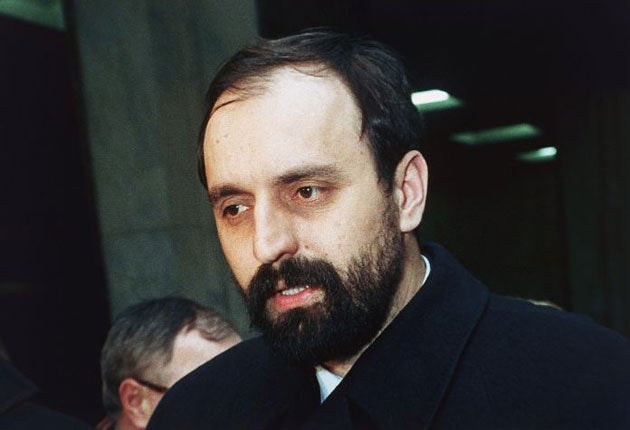Your support helps us to tell the story
From reproductive rights to climate change to Big Tech, The Independent is on the ground when the story is developing. Whether it's investigating the financials of Elon Musk's pro-Trump PAC or producing our latest documentary, 'The A Word', which shines a light on the American women fighting for reproductive rights, we know how important it is to parse out the facts from the messaging.
At such a critical moment in US history, we need reporters on the ground. Your donation allows us to keep sending journalists to speak to both sides of the story.
The Independent is trusted by Americans across the entire political spectrum. And unlike many other quality news outlets, we choose not to lock Americans out of our reporting and analysis with paywalls. We believe quality journalism should be available to everyone, paid for by those who can afford it.
Your support makes all the difference.Serbia arrested the last major war crimes suspect from the 1990s conflicts in former Yugoslavia today, closing what its president said was a "burdensome" page in the country's history.
Goran Hadzic, a Croatian Serb wartime leader indicted for crimes against humanity during the 1991-1995 Croatian war, was picked up by Serb forces in the picturesque Fruska Gora national park region about 40 miles north of Belgrade.
"We nabbed him while he was about to meet a helper. He had changed his appearance somewhat and had fake papers on him," an operative familiar with the case told Reuters. "He did not resist arrest, but we were ready for all contingencies."
Hadzic, 52, was a key figure in the breakaway Krajina Serb republic in Croatia, and after the arrest of wartime Serb General Ratko Mladic earlier this year, he was the last suspect sought by the United Nations war crime tribunal in The Hague.
"We have closed a burdensome and gloomy page of our history," said President Boris Tadic, who called a special news conference to announce the arrest.
"We did this for the people of Serbia, for other nations, for the victims and for reconciliation."
The European Union, which hailed Belgrade for finding Mladic in May, had insisted on Hadzic's arrest for Serbia to progress towards European Union membership.
"This is a further important step for Serbia in realising its European perspective and equally crucially for international justice," three top EU officials said in a joint statement welcoming the arrest.
Tadic said Serbian security agents arrested Hadzic near the village of Krusedol, a short drive from the Croatian town where he was born.
Fruska Gora contains many holiday homes and 16 Serbian Orthodox monasteries.
Tadic did not say where he had been hiding, but, seeking to squash speculation that either the church or military had harboured him, he said Hadzic was not arrested in a monastery or a military barracks.
Parts of the military had helped Mladic evade arrest for years and the Serbian Orthodox church played a controversial role in the Yugoslav wars, often stoking the flames of nationalism against Catholic Croats and Muslim Bosniaks, who largely descend from the same stock of south Slavs as the Serbs.
Hadzic's arrest, and that of Mladic, follows intensive work by Serbian officials over the past three years, Tadic said, citing the killing of Osama bin Laden earlier this year after a decade-long US manhunt.
"We also had the same situation," he said.
Hadzic is charged with ordering the killing of hundreds and the deportation of thousands of Croats and other non-Serbs from the region of Croatia he took over.
Croatian Prime Minister Jadranka Kosor said her country had waited too long.
"Of course the arrest of Hadzic is good news for humanity and the whole world, but first and foremost for us in Croatia," she told a news conference in Warsaw via an interpreter.
For years Hadzic was overshadowed by the higher profile ethnic Serb fugitives Radovan Karadzic, the Bosnian Serb leader, and his military commander Mladic. Hadzic may ultimately be remembered mostly as the man who evaded justice longer than others charged with crimes in the 1990s Yugoslav wars.
"He is much more discreet than the others in terms of personality and what he did," said Anna Maria Corazza Bildt, a member of European Parliament who served during the war with UN forces in the region of Croatia where Hadzic was a regional leader. "He was not a particularly notable personality."
Both Nato and Swedish Foreign Minister Carl Bildt, a former EU and UN Envoy to the region, said it closed an important chapter in recent European history.
"I warmly congratulate Serbia," Bildt said.
The UN war crimes prosecutor Serge Brammertz said Hadzic was expected to be extradited to the court in The Hague "within days" - the last of the 161 suspects indicted by the court to be transferred.
"We can now say that no indicted person has successfully evaded the tribunal's judicial process. This is a precedent of enduring significance," Brammertz said.
Hadzic lived openly in the northern Serbian city of Novi Sad until July 2004, when The Hague sent an indictment and arrest warrant to Belgrade. He fled immediately, tipped off by nationalist hardliners in Serbia's security services.
His escape was kept a secret for days, while relatives said he was at home and police denied having orders to arrest him. The Hague later made public surveillance pictures showing him leaving his house with a bag.
Hadzic, an ex-warehouse foreman who rose to prominence as a Serb nationalist activist in early 1990s, also gained notoriety for his involvement in murky deals including illegal exports of oak, stolen cars, wine and crude oil from a well under Serb control.
He was frequently seen in the company of Zeljko "Arkan" Raznatovic, a paramilitary leader and then head of Belgrade's underworld.

Join our commenting forum
Join thought-provoking conversations, follow other Independent readers and see their replies
Comments